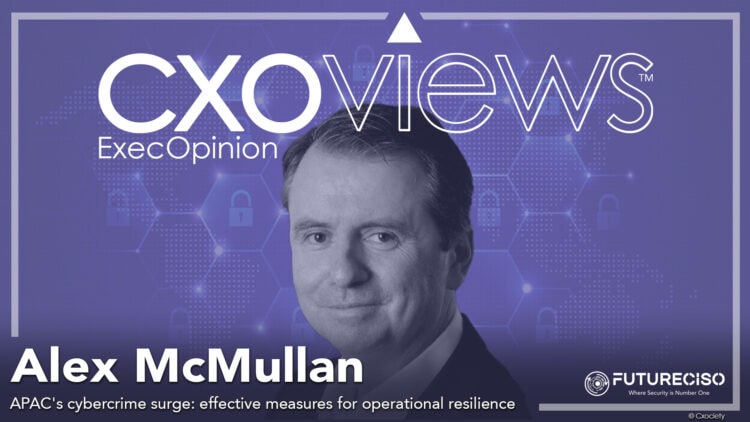The Asia Pacific accounted for 23% of global cybersecurity incidents in 2023, according to the IBM X-Force Threat Intelligence Index, underscoring that the region is more prone to cyber-attacks than the others.
The World Economic Forum tagged the region as the new "ground zero" for cybercrime incidents, citing research revealing that APAC had the highest year-over-year increase in weekly cyberattacks in the first quarter of 2023, with an average of 1,835 attacks per organisation, higher than the global average of 1,248 attacks per week.

Alex McMullan, CTO International at Pure Storage, cites several reasons, such as "the accelerated digital transformation taking place throughout the region while making organisations more connected, and also more vulnerable to cyber attacks."
He also noted the heavy concentration of manufacturing companies in Asia, making it a common target for cybercriminals. In recent years, Southeast Asia has risen as a global manufacturing hub and retains its attractiveness to global investment even with reshoring movement in other areas.
Aside from that, McMullan said the lower awareness of security among employees in the region makes APAC more vulnerable to cyberattacks.
"Security training firm KnowBe4 recently carried out 600,000 phishing simulation tests in 1,200 organisations in APAC and found that one in three employees were likely to click on a suspicious link or comply with a fraudulent email, well below the global baseline of 34.3%," he explained.
However, the Pure Storage executive said that APAC companies experience the same impact of cyber attacks as in other regions, such as "operational downtime, disruption to the business, loss of intellectual property, and resulting financial losses which could include payment of ransom and penalties by regulators."
Recently, a cyber attack compromised Indonesia's data centre, disrupting government services and compromising sensitive data. McMullan describes this as a "high-profile example of how vulnerable organisations in the region are and how damaging these attacks can be, disrupting airport immigration and other government services."
Most disruptive operational impacts of cyber attacks
"The headline grabber will always be the financial losses," McMullan said on the most disruptive impacts of cyberattacks, citing a study by Microsoft and Frost & Sullivan revealed that the potential economic loss from cyber-attacks could reach US$1.745 trillion in the Asia Pacific region.
McMullan also included business operations disruption negatively affecting regulated industries' revenue, reputation, and financial penalties. "We have observed these impacts in shipping, healthcare, financial services, and transport across the globe," he said.
"However, what could potentially be more damaging long term for any organisation is the loss of its data and intellectual property, which in most cases leads to incalculable losses," said McMullan.
Communication strategies
When a cyberattack happens, companies' communication strategies are essential for the benefit of the company stakeholders.
"The organisations that have emerged best from cyber attacks are those that have been proactive in their communications in the immediate aftermath of an attack and the ongoing resolution," McMullan posits.
The organisations that have emerged best from cyber attacks are those that have been proactive in their communications in the immediate aftermath of an attack and the ongoing resolutionAlex McMullan
He said publicly listed companies must comply with rules, mainly when a cyber attack compromises consumer data and requires the involvement of external authorities.
"The best approach is to be as upfront as possible, within any guidelines and regulations, and be clear about the impact to customers and other stakeholders," he added.
Emerging trends and technologies
In the event of cyberattacks, technology leaders can consider emerging trends and technologies to mitigate their operational impacts.
McMullan believes that emerging technologies, when harnessed correctly, can be a boon for an organisation's cybersecurity strategy, offering a ray of hope amidst the cyber threat landscape.
"Take AI, for example. The rapid advancement of deepfake technologies combined with Generative AI is creating new ways to dupe employees. On the flip side, AI can also be used to combat cyber attacks by predicting, detecting, analysing, and responding to threats," he explains.
Further, he said that hardware or software systems have imperfections that require cutting-edge technologies to strengthen security. He warns that "criminal enterprises and nation-state adversaries have access to those same technologies to try and detect security flaws."
He recommends that organisations consider storage systems with enterprise-grade encryption and a default SafeMode that creates immutable snapshots, as well as enhanced cyber recovery and resilience service level agreements that ensure the restoration of normal operations.
"We are seeing cyber resilience service level agreements as an increasingly favourable approach to give customers peace of mind and to put the onus on their technology providers," he said.
Not if, but when
According to McMullan, it's crucial for technology leaders to remember that cybersecurity is an ongoing process. He urges organisations to be prepared, as a cyber attack is not a matter of 'if' but 'when '.
With this more proactive approach, organisations can better prepare for cyber attacks and help minimise their operational impact.



